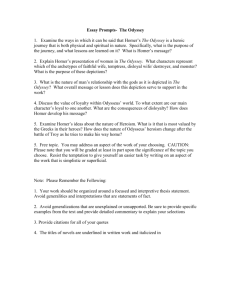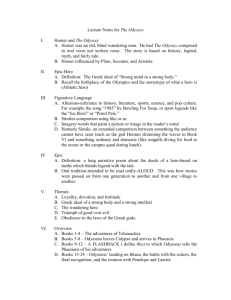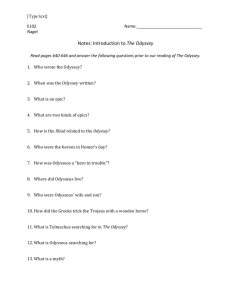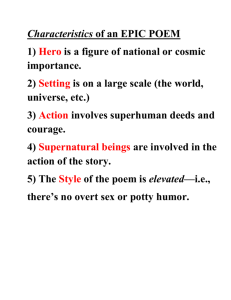course ideas
advertisement
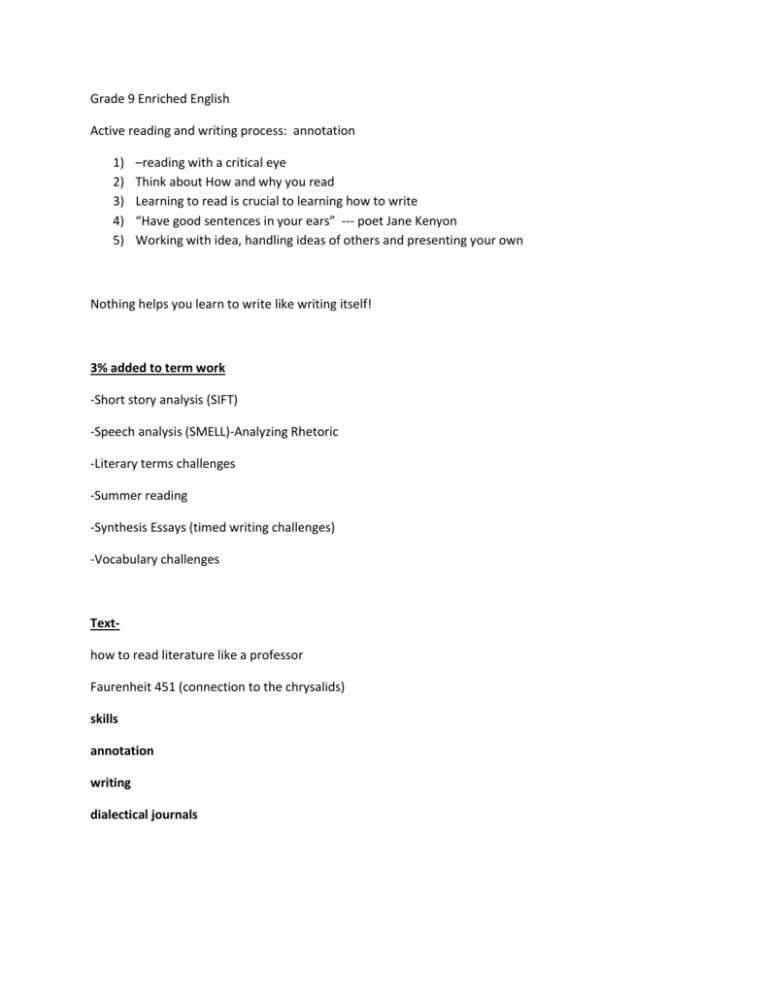
Grade 9 Enriched English Active reading and writing process: annotation 1) 2) 3) 4) 5) –reading with a critical eye Think about How and why you read Learning to read is crucial to learning how to write “Have good sentences in your ears” --- poet Jane Kenyon Working with idea, handling ideas of others and presenting your own Nothing helps you learn to write like writing itself! 3% added to term work -Short story analysis (SIFT) -Speech analysis (SMELL)-Analyzing Rhetoric -Literary terms challenges -Summer reading -Synthesis Essays (timed writing challenges) -Vocabulary challenges Texthow to read literature like a professor Faurenheit 451 (connection to the chrysalids) skills annotation writing dialectical journals Looking for Odysseus: a Rhetorical Analysis Assignment In the next 80 minutes of class time, you will access the predetermined sources below in order to prepare a multi-paragraph written response. **NOTE: This is DOUBLE the normal allotted time for this kind of essay response. Using at least three of the sources, prepare a multi-paragraph response to the question below. Many view mythology and all ancient literature as something make-believe, but what would happen if these stories were nonfiction accounts of true events? How would our understanding of ancient times be affected? In 2003, a radical alternative was proposed. What if Homer has been right all along? What if this mismatch has occurred not because of geographical errors by the poet, but because of geological changes in the landscape? Could something unprecedented have altered the layout of these islands since the time of the Trojan War around 1200 BC? Since 2003 an interdisciplinary project team of geologists, classicists and archaeologists has been testing this hypothesis and the results that have emerged are astonishing. We have been able to reconstruct the former layout of these islands and it provides a compelling solution to the long-established enigma of the location of Homer's Ithaca. Where is the Ithaca described in such detail in Homer's Odyssey? The mystery has baffled scholars for over two millennia because Homer's descriptions bear little resemblance to the modern island called Ithaki, one of the Ionian Islands off the coast of western Greece. Homer himself is thought to have lived far away in Asia Minor (western Turkey) several hundred years after the events of the Odyssey, so most experts think that he based his poem on stories he had heard of distant Ithaki. The geographical mismatch in his poems perhaps reflected his lack of familiarity with the Ionian Islands, together with the fact that he was composing a poem rather than a travel guide. Odysseus' island is no longer a fantasy. Source A: Odysseus Unbound <http://www.odysseus-unbound.org/index.html> Source B: Odysseus Lies Here? <http://www.nytimes.com/2012/03/11/opinion/sunday/kristof-odysseus-lieshere.html?_r=0> Source C: Odyssey's End? <http://www.smithsonianmag.com/peopleplaces/Odysseys-End-The-Search-for-Ancient-Ithaca.html> Source D: Greeks discover "Odysseus' Palace" <http://www.telegraph.co.uk/news/worldnews/europe/greece/7962445/Greeks-discoverOdysseus-palace-in-Ithaca-proving-Homers-hero-was-real.html> Source E: Odysseus' Return dated <http://www.nbcnews.com/id/25337041/ns/technology_and_science-science/t/odysseusreturn-trojan-war-dated/> Submit Never submit passwords through Google Forms. Powered by Google F or ms This form was created outside of your domain. Report Abuse - Terms of Service - Additional Terms 1) Introduction to Pre-Ap Concepts Annotation Dialectic Journals Masters of Metaphor (introduction to you) Vocabulary Quizzes Literary devices Quizzes Grammar Workshop/ Booklets 2) Holding Out for a Hero: (Mythology) Epic Poem: The Odyessy (Homer)-smoop –vidoes Epic Hero Cycle Archetypes Synthesis multi-paragraph response Mythology Fashion Show Upcoming Mythology and Folklore Pageant You will each represent a god, goddess, person, or entity at the pageant (you will receive an entry card showing the name of the entity you are to represent). On that day, you must be dressed for the part and must have at least one significant or symbolic attribute. The presentation itself will consist of the most important details on the halfsheet study guide that you must provide for each member of the “audience.” You must (1) dress for the part, (2) provide a copy of the completed half-sheet for everyone, and (3) be able to identify the most important element of this person or figure. At the end of the period, there will be an opportunity to elect the winner of the pageant! Mythology Terms: I assign the following terms for students to present in the pageant and then review for the first mythology test. The rest of the year we continue to use the glossaries to look up relevant terms that come up in the reading and class discussions. Classical Mythology Achilles Cassandra Elysian Fields Adonis Cerberus fauns Aeneas Ceres/Demeter Golden Fleece Ares/Mars chimera Hades Argus Circe Holy Grail Athena/Minerva Daedalus Hector Atlas amocles Henry, John 3) The Good, The Bad and the Ugly: The Human Condition The Chrysalid’s (novel): Literary / Expository Essay The Lottery (short story) The Most Dangerous Game (short Story) Tell Tale Heart (short story-Edgar Allan Poe) The Jade Peony (short story) Lead into next unit 4) Justice, Equality, diversity and Tolerance: (The Merchant of Venice) The Merchant of Venice “I have a Dream” Speech Martin Luther King (analysis) “Ain’t I a Woman” Sojourner Truth Speech (sift and Compare) 5) Media News articles (current) Editorials Advertising *Magazine publication

